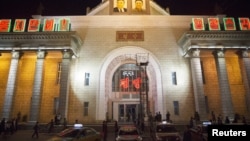Markets in North Korea have expanded in most cities over the past 10 years, a possible indication that authorities are losing their grip on the country's economy, a new report by a U.S. think tank says.
As the communist country's centralized economy and food distribution system have become increasingly dismantled since the great famine of the late 1990s, markets in various forms and sizes have sprung up across the country.
Markets first served as a rare means of getting food, but grew to be a venue for a profit-making enterprise. Over time, many markets have been formalized and integrated into the public finance system through taxes and administrative permits, according to the report by the Johns Hopkins U.S.-Korea Institute.
The report highlighted findings from a study that examined the trend of markets in major North Korean cities, including the capital, Pyongyang, by analyzing information from various sources, including interviews with defectors and satellite imagery of the cities between 2008 and 2014.
"Most markets in North Korea have either grown or remained at a virtually unchanged level in recent years," the report concluded.
In Sinuiju, a northwestern city bordering China, total market space grew by 114 percent between 2003 and 2014. Other cities experienced more moderate increases. In Kaesong, home to an inter-Korean industrial complex, aggregate market size grew by approximately 16 percent between 2004 and 2013.
Growth amid crackdown
Analysts say the findings suggest the North Korean government's efforts to suppress markets are inadequate.
"Market trade is very difficult to get rid of, even when the government wants to," Benjamin Silberstein, who authored the report, said at an event in Washington this week. Silberstein is a nonresident fellow at the Center for Strategic and International Studies, a think tank in Washington.
Silberstein said big wholesale markets appear vulnerable to stepped-up government action, but street markets have increased despite such moves. "We see at the same time that the big wholesale markets were closed down and street market space shot up," he said.
The report said Pyongyang was an exception to the trend as markets have diminished in the city in recent years because of a major crackdown by the government in 2010.
But North Korea does appear to be easing restrictions on markets outside the capital.
"Clearly, markets are expanding in North Korea at the present, and it is an indication that the government is more tolerant of them," wrote Stephen Haggard, a professor at the University of California-San Diego who follows North Korea's economy closely, in an email to VOA.
But Haggard said he suspected that Pyongyang was continuing to allow markets to expand.
"The key issue is credibility: Can the government allow this process to continue?" asked Haggard.
Jee Abbey Lee contributed to this report, which was produced in collaboration with the VOA Korean service.












